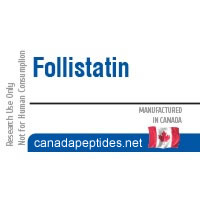Project Description
 FST / Follistatin Protein Description
FST / Follistatin Protein Description
Follistatin, also known as Activin-binding protein and FST, is a secreted protein. Follistatin / FST is an autocrine glycoprotein that is expressed in nearly all tissues of higher animals. Follistatin / FST contains 3 follistatin-like domains, 3 Kazal-like domains and 1 TB (TGF-beta binding) domain. Follistatin / FST is produced by folliculostellate (FS) cells of the anterior pituitary. FS cells make numerous contacts with the classical endocrine cells of the anterior pituitary including gonadotrophs. Isoform 1 of Follistatin / FST is the predominant isoform in serum but is undetectable in follicular fluid. Follistatin / FST is a specific inhibitor of the biosynthesis and secretion of pituitary follicle stimulating hormone (FSH). Follistatin / FST binds directly to activin and functions as an activin antagonist. Follistatin / FST was initially isolated from follicular fluid and was identified as a protein fraction that inhibited follicle-stimulating hormone (FSH) secretion from the anterior pituitary, and so was known as FSH-suppressing protein (FSP). Follistatin / FST and BMPs are known to play a role in folliculogenesis within the ovary. The main role of Follistatin / FST in the oestrus/menstrus ovary appears to be progression of the follicle from early antral to antral/dominant, and importantly the promotion of cellular differentiation of the estrogen producing granulosa cells (GC) of the dominant follicle into the progesterone producing large lutein cells (LLC) of the corpus luteum.

 FST / Follistatin Protein Description
FST / Follistatin Protein Description